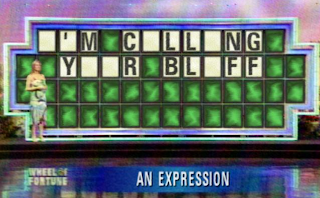A Game of Partial Information, Played for Money
 Over the course of the first six weeks or so of my “Poker in American Film and Culture” class, we’ve been primarily tracing the game’s history and here lately delving a bit further into the “culture of poker” as well.
Over the course of the first six weeks or so of my “Poker in American Film and Culture” class, we’ve been primarily tracing the game’s history and here lately delving a bit further into the “culture of poker” as well. As we’ve wound our way through the Old West and Mississippi riverboats and saloons and home games and card clubs and casinos, we’ve frequently encountered writers attempting to define (and usually defend) the game of poker by identifying certain fundamental elements of the game -- elements which, you might say, are absolutely necessary to poker and help make it different from other games or pursuits.
Two such elements have come up time and again in our survey thus far. One is that poker, unlike some (but not all) other games, is a game of partial information. Usually it is chess that is evoked as a contrasting example, a game in which all of the pieces and every move can be viewed by all. Not so in poker. Regardless of the variant, poker always involves players not knowing with absolute precision what exactly they are up against.
The other defining characteristic of poker (according to many) is that it requires money -- that without it, say some, the game cannot be called poker. Not really. To quote from just one of our writers’ statements of the position (John Lukacs), “Money is the basis of poker... [and] poker becomes utterly senseless if played without it.”
While that first point about poker being a partial information game seems a hard one to dispute, the second one insisting that poker is “senseless” without money being wagered is perhaps debatable. I can imagine some arguing the contrary view, anyway, although I don’t think I’d agree with them. Rather am I persuaded to accept the idea and say that the wagering of real money is in fact an essential characteristic or “basis” of poker.
Been following the many different dramas in poker that have been popping up over the last week, and it struck me how all of them in different ways kind of go back to those two “premises” of poker (so to speak) -- that it is a game of partial information and it is a game played for money.
Almost sounds like a formula for drama, if you think about it. A contest for money which requires competitors to hide, to mislead, to deceive? Can’t go smoothly, that.
I’m referring to stories like the whole “PeachyMer” saga that has been playing out on Two Plus Two over the last week-and-a-half, John Racener’s recent charge that Sorel Mizzi tried to cheat him in a private Chinese poker game, and (of course) the latest, jaw-dropping revelations regarding the UB scandal that are being provided by Travis Makar (former “right-hand man” to Russ Hamilton) to the fellas over on DonkDown.
All of these stories are marked by a great deal of “partial information” -- both among the characters involved and for those of us curious to sort out once and for all what the heck happened in each. And all, of course, are also about money. Or, to put it another way, none likely would’ve occurred if money weren’t involved.
How it has always been with poker, I guess. A game in which all players necessarily have something to hide. And something for which to play.
Labels: *the rumble, DonkDown, Poker in American Film and Culture, Two Plus Two














1 Comments:
These two elements - partial information and money - are what makes me think that poker is really a great proxy for economic modelling.
Get this course over to the UK, please !
Post a Comment
<< Home